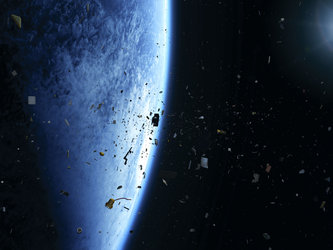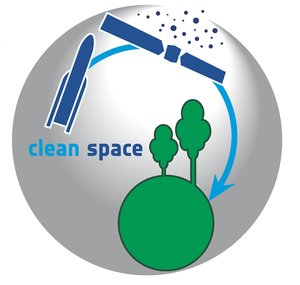More successful than we expected: Luisa Innocenti interview
Luisa Innocenti has been leading the Clean Space effort since it first received authorisation at ESA’s 2012 Council of European Ministers, while also serving as its ambassador to the wider European and global space sectors. With a new Ministerial council due this time next year, Luisa discusses Clean Space’s story so far, and the initiative’s prospects.
Has Clean Space progressed in the way you expected?
It’s been more successful than we expected at the beginning. We always knew it was an important topic, but other people in the space industry were cooler towards it. That has changed since 2012, particularly on the space debris side.
On the one hand we had Hollywood making the big budget Gravity movie to help dramatise the issue for the general public, on the other we have also had numerous practical demonstrations that debris is a real problem that has to be confronted. For instance, last year ESA’s Sentinel-1A mission had to perform a collision avoidance manoeuvre just into its second day after launch, which is unprecedented.

So the old standoffish-ness is gone. Nobody is saying, either within the Agency or worldwide, that debris is not a real problem. Certainly no one wants to be identified as a polluter.
On the terrestrial side of Clean Space – seeking to assess the environmental impacts of the space industry and come up with greener methods and technologies where appropriate – it is harder. There are more voices saying “We do not have a problem.” Their argument is that the space industry has a relatively low frequency of missions and of launches, and so cannot be doing any significant environmental harm.
To which we tell them, well that sounds good, but do you have any numbers to back up that claim? These beliefs are not always based on anything solid, and that isn’t good enough – we need to know for sure.

What about the threat of commonly used space materials being banned by updated environmental regulations – does that concentrate minds?
Right now there is awareness in industry about regulatory programmes such as the European Union’s REACH, but there isn’t much concern, it’s not really being seen as a priority. That might change if something like hydrazine (the propellant of choice for satellites) is banned, but the general assumption is the space industry will always be able to apply for a waiver. We’ll see!
We’re really leaders in the eco-design area, but it’s still going to take a while. No matter if a replacement technology will be less polluting and easier to handle, mission designers will be tempted to stay with the original technology if it is already qualified and familiar.
That said, younger people are proving very responsive. We’ve recently run our first internal ESA training course on eco-design applied to space mission planning, and are preparing a handbook on the subject.

Do you repeatedly come up against the same kind of arguments?
Other than saying we don’t need it, there are those who claim Europe simply can’t afford it, but it is a low cost really, in order to secure our future use of space. It’s a lot like the climate change crisis: the experts are saying we have a big problem, but there are still those who don’t want to acknowledge it.

Clean Space has been remarkably productive, hasn’t it, in terms of spawning new programmes to be presented to next year’s ESA Ministerial conference?
We hope that the e.Deorbit active debris removal mission being prepared within Clean Space will be developed as a programme of its own – that was always the intention. In addition, the greener manufacturing techniques that we were also initially investigating, such as 3D printing and friction stir welding, have subsequently become part of a new cross-cutting initiative on advanced manufacturing.
There is also the CleanSat programme in which we have encouraged the big companies to work together to identify the building blocks to make satellites more compliant with regulations.

Where did the impetus for Clean Space’s new CleanSat programme come from?
CleanSat aims at ensuring the next generation of low-orbiting satellite platforms stay compliant with international debris mitigation regulations in terms of issues such as passivation and deorbiting. Certainly, this is becoming an ever-more relevant concern in terms of the mega-constellations now planned for low orbits.
Early on in Clean Space we found ourselves issuing parallel contracts to the ‘big three’ satellite primes – Airbus Defence and Space, Thales Alenia Space and OHB – dealing with aspects of these issues. But that approach wasn’t sustainable. So the idea became, why not try a coordinated approach, aiming to develop common technology building blocks? Obviously these are very competitive companies, but debris is a common problem confronting them all.
We were still very nervous about bringing the big three together, but in fact it has worked very well in practice, as they come together with us to decide on priority technology areas and assess potential solutions to be researched through CleanSat in the coming year. And internally, ESA’s Earth observation programme is on board – they will be flying many missions in low orbits, and they want them to be fully compliant.

How do you see Clean Space evolving?
Former ESA Director General Jean-Jacques Dordain used to say that if Clean Space does its job well enough there will no longer be a separate Clean Space – it will become the entire Agency because the concerns and activities we are focused on will have become entirely mainstream.
In the meantime, no matter what various programmes Clean Space gets involved with, it is true to say we have brought together a broad community of like minds, keeping track of what is going on, and I like to think this group will endure.















 Germany
Germany
 Austria
Austria
 Belgium
Belgium
 Denmark
Denmark
 Spain
Spain
 Estonia
Estonia
 Finland
Finland
 France
France
 Greece
Greece
 Hungary
Hungary
 Ireland
Ireland
 Italy
Italy
 Luxembourg
Luxembourg
 Norway
Norway
 The Netherlands
The Netherlands
 Poland
Poland
 Portugal
Portugal
 Czechia
Czechia
 Romania
Romania
 United Kingdom
United Kingdom
 Slovenia
Slovenia
 Sweden
Sweden
 Switzerland
Switzerland






























